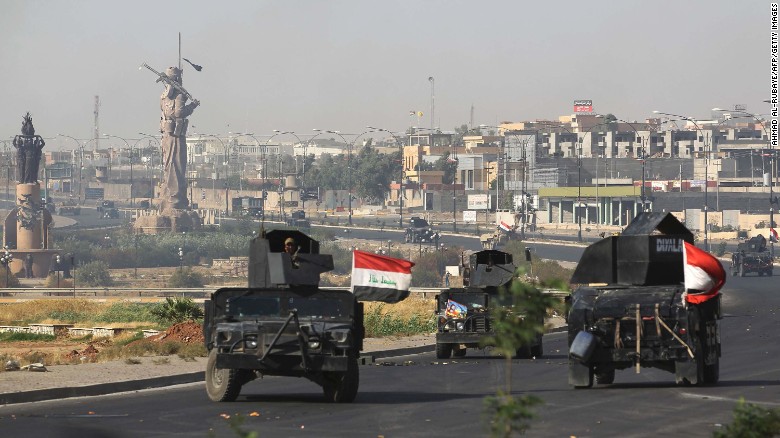Betrayal, Conquest
"Iraqi forces and Iranian-backed Popular Mobilization Forces [attacked in] a major, multi-pronged operation] deploying] U.S. military equipment, including Abrams tanks and Humvees."
Kurdistan regional government, security council report
 |
| Iraqi forces advance to the center of Kirkuk during the operation against Kurdish fighters. CNN |
Kirkuk was lost to Kurdistan as an object lesson in how two hostile nations conspiring together to defeat the aspirations of a courageous nation of unacknowledged sovereignty could be defeated by superior force of arms, threats and aligned enemies assembled in greater numbers to overwhelm the plans of those deserving of recognition but denied it. Kurdish Governor Majmaddin Karim had little option but to exit his post for the capital of autonomous Kurdistan.
Iraqis triumphantly waved national flags, minority Turkmen celebrated in central Kirkuk while the sectarian Shiite chants of conquest underscored the battle won by Iraq through the overwhelming presence of conjoined Shiites in denying the Kurds their birthright. The Popular Mobilization Forces, predominantly Shiite militia coalition serving Iranian purposes and policies were key to Iran's and Iraq's victory. The Kurds can recognize their oppressors through long exposure to the whims and vagaries of a fate that has kept them subservient to governments in Iraq, Syria, Turkey and Iran.
Peshmerga forces had little option but to withdraw from Kirkuk, holding back on their instinct to fight, once Baghdad issued its ultimatum. Columns of armoured vehicles and pickup trucks driven by Kurdish fighters left their positions around the contested city crowding roads jammed with Kurdish civilians fleeing the punishment they know would be theirs. "They cheated us and we've been betrayed", shouted Kawa Mustafa Mohamed. "I don't know where I'm going now but my father was killed by the Iraqis and I don't want that to happen to my family."
The situation is surely being celebrated by the Islamic State. The possibility of a new civil war where attention will turn on the protagonists, the Iraqis and their allies opposed to the Kurds. The very Kurds who were most successful in fighting the Islamic State groups that the Iraqi military fled in panic from. Disorganized bands of Kurdish gunmen, not part of the Peshmerga insisted they would defend the city. It was the Peshmerga whose generals were informed of an incipient bloodbath if they resisted the arrival of the Iraqi military and its allies.
 |
| Two Kurdish soldiers ... Kurdistan 24 |
Kurdish forces took geography from the Islamic State, and have been in control of Kirkuk since 2014 after the federal forces fled, abandoning their defences and materiel as ISIL advanced across northern Iraq. Taking possession of Kirkuk, the Kurdish government exported oil from the oilfields of Kirkuk to the extent of 350,000 barrels of oil daily, contributing to their economy, making amends for Baghdad's failure to restore budget payments to the region.
"We assure our people in Kurdistan, and in Kirkuk in particular, that we are keen on their safety and best interest", announced Haider Al Abadi, Iraqi prime minister. Who among the Kurds believes that sanctimonious promise? First the punch of military force, then the economic squeeze.... Of an event that translated as a catastrophe for Kurdish sovereignty aspirations, the U.S. toward whom the Kurds represented their best, most effective allies in the fight against Islamic State, characterized the situation as a "misunderstanding."
"The greatest evil everywhere is ISIL. It's the defeat of Islamic State that is key. The trouble is, people in Iraq believe the fight against ISIL is over, and that it's focused in Syria, but there are still pockets in Iraq."
Hamish de Bretton-Gordon, former British Army officer, Kurdish Peshmerga adviser
Labels: Conflict, Independence, Iraq, Iraqi Military, Kurdistan, Peshmerga

<< Home